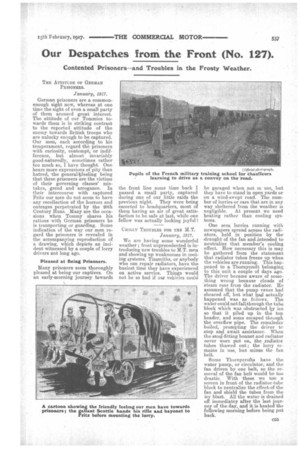Our Despatches from the Front (No. 127).
Page 17

If you've noticed an error in this article please click here to report it so we can fix it.
Contented Prisoners—and Troubles in the Frosty Weather.
TEE ATTITUDE OF GERMAN PRISONERS.
January, 1917.
German prisoners are a commonenough sight now, whereas at one time the sight of even a small party of them aroused great interest. The attitude of our Tommies towards them is in striking contrast to the reported attitude of the enemy towards British troops who are unlucky enough to be captured. Our men, each according to his temperament, regard the prisoners with curiosity, contempt, i or indifference, but almost invariably good-naturedly, sometimes rather too much so, I have thought. One hears more expressions of pity than hatred, the generaltfeeling being that these prisoners are the victims of their governing classes' mistakes, greed and arrogance. In
• their intercourse with captured Fritz our men do not seem to have any recollection of the horrors and outrages perpetrated by the 20th Century Huns. Many are the occasions when Tommy shares his rations with German prisoners he is transporting or guarding. Some indication of the way our men regard the prisoners is revealed in the accompanying reproduction of a drawing, which depicts an incident witnessed by a couple of lorry drivers not long ago.
Pleased at Being Prisoners.
Many prisoners seem thoroughly pleased at being our captives. On an early-morning journey towards the front line some time back I passed a small party, captured during one of our little raids the previous night. They were being escorted to headquarters, most of them having an air of great satisfaction to be safe at last, while one fellow was actually looking joyful!
CHILLY TROUBLES FOR THE TILT.
January, 1917.
We are having some wonderful weather ; frost unprecedented is introducing new troubles to M.T. men and showing up weaknesses in cooling systems. Tinsmiths, or anybody who can repair radiators, have the busiest time they have experienced on active service. Things would not be so bad if our vehicles could be garaged when not in use, but they have to stand in open yards or on a wind-swept road. The number of lorries or cars that are in any way sheltered from the weather is negligible. At present we need heating rather than cooling systems.
One sees lorries running with newspapers spread across the radiators held in position by the draught of the fass and intended to neutralize that member's cooling effect. How necessary this is may be gathered from the statement that radiator tubes freeze up when the vehicles are running. This happened to a. Thornyceoft belonging to this unit a couple of days ago. The driver became aware of something wrong because clouds of 'steam rose from the radiator. He assumed that the pump vanes had sheared off, but what had actually happened was as follows. The water could not falLthrough the tube block which was obstructed la ice so that it piled up in the top header, and some escaped through the overflow pipe. The remainder boiled, prompting the driver te stop and await assistance. When the snug-fitting bonnet and radiator cover were put. on, the „radiator tubes thawed out ; the lorry remains in use, but minus the fan belt.
Some Thornycrofts have the water pump, or circulator, and the fan driven by one belt, so the removal of the fan belt. would be too drastic. With these we use a screen in front of the radiator-tube block to neutralize the effect.of the fan and shield the tubes from the icy blast. All the water is drained off immediatey after the last journey of the day, and it is heated the following morning before being put back.






















